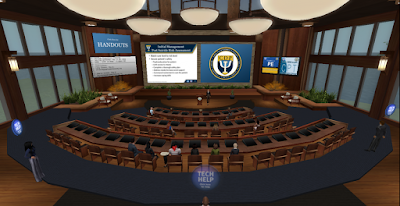By Gentle Heron
Ever wondered how to attend a conference in Second
Life if you don’t have a virtual world avatar?
Will you be at work during the conference time, unable
to justify having a virtual world open on your computer screen, but willing to
listen in to the speakers?
What can you do other than attend the Mental Health
Symposium as an avatar?
You can watch it live as it is streamed from Second
Life through YouTube.
The best thing to do is to subscribe to the Virtual
Ability, Inc. YouTube Channel. Then tune in at 8:30 am Pacific time on Friday,
April 26, to view all the conference proceedings.
Or just follow this link at 8:30 am Pacific time on Friday, April 26.
https://www.youtube.com/channel/UCecFbqrNpnAbfaEohz8HIhQ/live
So even if you’re not able to sit in the Sojourner
Auditorium on Virtual Ability island, you will be able to hear and see the full
conference.
Please do join us.











